

Simple blood test diagnoses Parkinson's disease long before symptoms appear. Public release date: 30-Nov-2011 [ Print | E-mail Share ] [ Close Window ] Contact: Cody Mooneyhancmooneyhan@faseb.org 301-634-7104Federation of American Societies for Experimental Biology Bethesda, MD—A new research report appearing in the December issue of the FASEB Journal ( shows how scientists from the United Kingdom have developed a simple blood test to detect Parkinson's disease even at the earliest stages.
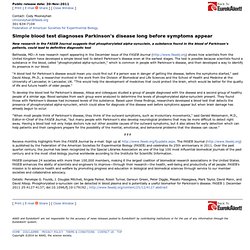
Civitas Therapeutics Announces MJFF Grant to Study Lead Drug Candidate for Parkinson's Disease. The State of Science in Parkinson’s Research. One-Time Monthly In Tribute Team Fox Tweet HOME › Our Role & Impact › FoxFeed Blog The latest reporting and analysis on breakthroughs in Parkinson's research and issues that matter most to you.

National Institutes of Health Receives $3 Billion Spending Boost March 22, 2018 The spending deal was released last night and the bill must be passed by this Friday, March 23. News in Context: Dr. Lorenz Studer Pioneers Novel Stem Cell Technique in Pre-Clinical Models of Parkinson’s Disease. MJFF Awardees Establish Link Between Solvent Exposures and Parkinson’s Disease Risk. Parkinson's Disease Linked To Industrial Solvent Exposure. Stem cell research hopes to repair brain damage of Parkinson's disease. Australian scientists have developed a new technique using stem cells, in the hope to replace damaged cells in Parkinson's disease.
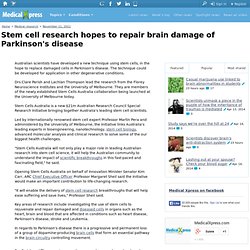
The technique could be developed for application in other degenerative conditions. Drs Clare Parish and Lachlan Thompson lead the research from the Florey Neuroscience Institutes and the University of Melbourne. They are members of the newly established Stem Cells Australia collaboration being launched at the University of Melbourne today. Stem Cells Australia is a new $21m Australian Research Council Special Research Initiative bringing together Australia's leading stem cell scientists.
Led by internationally renowned stem cell expert Professor Martin Pera and administered by the University of Melbourne, the Initiative links Australia's leading experts in bioengineering, nanotechnology, stem cell biology, advanced molecular analysis and clinical research to solve some of the our biggest health challenges. The 2011 NIKE MAG Auction Raises $4.7 Million for The Michael J. Fox Foundation for Parkinson's Research.
“Parkinsonian” Worms May Hold the Key to Identifying Drugs for Parkinson’s Disease, Says Scientist. Nov. 10, 2011 AUSTIN, Texas — Researchers at The University of Texas at Austin have devised a simple test, using dopamine-deficient worms, for identifying drugs that may help people with Parkinson’s disease.
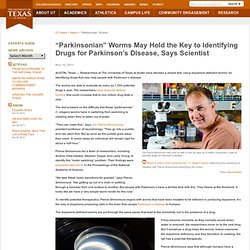
The worms are able to evaluate as many as 1,000 potential drugs a year. The researchers have received federal funding that could increase that to one million drug tests a year. The test is based on the difficulty that these “parkinsonian” C. elegans worms have in switching from swimming to crawling when they’re taken out of water. “They can crawl fine,” says Jon Pierce-Shimomura, assistant professor of neurobiology. Pierce-Shimomura led a team of researchers, including Andres Vidal-Gadea, Stephen Topper and Layla Young, to identify this “motor switching” problem. “We take these motor transitions for granted,” says Pierce-Shimomura, “like getting up out of a chair or walking through a doorway from one surface to another. Related rich media content:
Why do neurons die in Parkinson's disease? Public release date: 10-Nov-2011 [ Print | E-mail Share ] [ Close Window ] Contact: Erin Tornatoreerin.tornatore@childrens.harvard.edu 617-919-3110Children's Hospital Boston Boston, Mass. - Current thinking about Parkinson's disease is that it's a disorder of mitochondria, the energy-producing organelles inside cells, causing neurons in the brain's substantia nigra to die or become impaired.
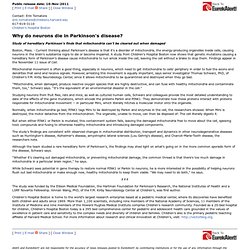
A study from Children's Hospital Boston now shows that genetic mutations causing a hereditary form of Parkinson's disease cause mitochondria to run amok inside the cell, leaving the cell without a brake to stop them. Findings appear in the November 11 issue of Cell. Mitochondrial movement is often a good thing, especially in neurons, which need to get mitochondria to cells' periphery in order to fuel the axons and dendrites that send and receive signals. Normally, when mitochondria go bad, PINK1 tags Miro to be destroyed by Parkin and enzymes in the cell, the researchers showed.
People with Parkinson's more likely to have leg restlessness than restless leg syndrome. People with Parkinson's disease may be more likely to have a movement disorder called leg motor restlessness, but not true restless legs syndrome as previous studies have suggested, according to a study published in the Nov. 9, 2011, online issue of Neurology, the medical journal of the American Academy of Neurology.
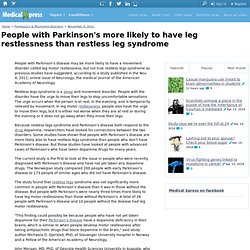
Restless legs syndrome is a sleep and movement disorder. People with the disorder have the urge to move their legs to stop uncomfortable sensations. The urge occurs when the person is at rest, in the evening, and is temporarily relieved by movement. In leg motor restlessness, people also have the urge to move their legs, but it is either not worse when they are at rest or during the evening or it does not go away when they move their legs. Because restless legs syndrome and Parkinson's disease both respond to the drug dopamine, researchers have looked for connections between the two disorders. Neuroderm succeeds in Parkinson's patch trial.
Sources inform ''Globes'' that Neuroderm Ltd. has achieved promising results in the primary endpoint of its Phase II clinical trial of ND0611, a carbidopa patch for treating Parkinson’s disease.

The drug delivery patch would improve the availability of orally administered levodopa. Oral levodopa is rapidly digested so require high dosages, which causes side effects. Neuroderm hopes that delivering the drug directly to the bloodstream via the skin will offer a more effective treatment for Parkinson's disease at lower dosages, and therefore fewer side effects. 1 neuron, 2 neurotransmitters and different effects on behavior. Public release date: 8-Nov-2011 [ Print | E-mail Share ] [ Close Window ] Contact: Bryan Ghoshbghosh@plos.org 44-122-344-2837Public Library of Science.
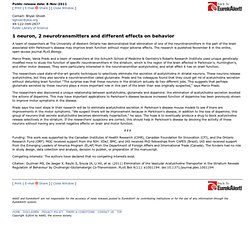
Mind control key to improving Parkinson's symptoms. How well can you control your thoughts?
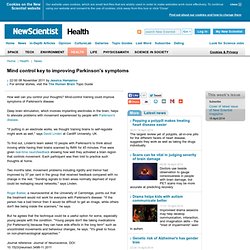
Mind-control training could improve symptoms of Parkinson's disease. Deep brain stimulation, which involves implanting electrodes in the brain, helps to alleviate problems with movement experienced by people with Parkinson's disease. "If putting in an electrode works, we thought training brains to self-regulate might work as well," says David Linden at Cardiff University, UK. To find out, Linden's team asked 10 people with Parkinson's to think about moving while having their brains scanned by fMRI for 45 minutes. Five were given real-time neurofeedback showing how well they activated a brain region that controls movement. Two months later, movement problems including rigidity and tremor had improved by 37 per cent in the group that received feedback compared with no change in the rest.
Cardiff University new Parkinson's therapy hope. 8 November 2011Last updated at 22:08 A brain scan of a patient with Parkinson's disease.
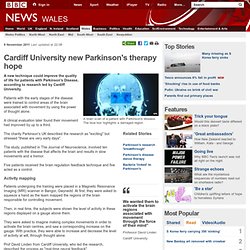
The blue box highlights a damaged region. Brain parasite directly alters brain chemistry. A research group from the University of Leeds has shown that infection by the brain parasite Toxoplasma gondii, found in 10-20 per cent of the UK's population, directly affects the production of dopamine, a key chemical messenger in the brain.
Their findings are the first to demonstrate that a parasite found in the brain of mammals can affect dopamine levels. Whilst the work has been carried out with rodents, lead investigator Dr Glenn McConkey of the University's Faculty of Biological Sciences, believes that the findings could ultimately shed new light on treating human neurological disorders that are dopamine-related such as schizophrenia, attention deficit hyperactivity disorder, and Parkinson's disease. This research may explain how these parasites, remarkably, manipulate rodents' behaviour for their own advantage. Dopamine is a natural chemical which relays messages in the brain controlling aspects of movement, cognition and behaviour.
Stem cells transformed into brain cells to treat Parkinson's disease. Brain cells that die off in Parkinson's disease have been grown from stem cells and grafted into monkeys' brains in a major step towards new treatments for the condition. US researchers say they have overcome previous difficulties in coaxing human embryonic stem cells to become the neurons killed by the disease. Tests showed the cells survive and function normally in animals and reverse movement problems caused by Parkinson's in monkeys. The breakthrough raises the prospect of transplanting freshly grown dopamine-producing cells into human patients to treat the disease. "Previously we did not fully understand the particular signals needed to tell stem cells how to differentiate into the right type of cells," said Dr Lorenz Studer at the Memorial Sloan-Kettering Cancer Centre in New York.
Focus on 'invisible' Parkinson's symptoms. Focus on 'invisible' Parkinson's symptoms [Posted: Thu 03/11/2011 by Deborah Condon www.irishhealth.com] Tremors are perhaps the most well known symptom associated with Parkinson's disease (PD). However, a new campaign is aiming to raise awareness of some of the lesser known symptoms associated with this condition. PD is a degenerative disorder of the central nervous system, which often impairs a sufferer's motor skills and speech. The disease belongs to a group of conditions known as movement disorders. PD-related tremors occur when a limb is at rest, but disappear when there is a purposeful movement. Abnormal oscillation in the brain causes motor deficits in Parkinson's disease.